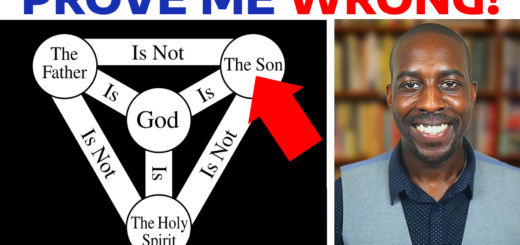Muslim Preacher Attacks the Bible But Ends Up Destroying the Quran
It’s not uncommon to see Muslim preachers try to undermine the Bible by pointing out what they believe are contradictions.
In a recent encounter, Shaykh Uthman Ibn Farooq attempted to shake the faith of an elderly Christian man. What he didn’t realize was that his own argument ended up turning against the Quran itself.
 The Accusation: A Contradiction in the Bible
The Accusation: A Contradiction in the Bible
The Shaykh turned to 2 Kings 8:26:
“Two and twenty years old was Ahaziah when he began to reign; and he reigned one year in Jerusalem. And his mother’s name was Athaliah, the daughter of Omri king of Israel.”
Then he compared it with 2 Chronicles 22:2:
“Forty and two years old was Ahaziah when he began to reign, and he reigned one year in Jerusalem. His mother’s name also was Athaliah the daughter of Omri.”
The Shaykh pressed the Christian man: “So was Ahaziah 22 or 42 years old when he became king?”
At first glance, this looks like a contradiction. But is it really?
 An Easy Answer
An Easy Answer
Most scholars call this a scribal error—copyists made mistakes while transmitting texts by hand over centuries. These errors do not undermine the Bible’s divine inspiration, but they do show that human scribes, like all people, were capable of small mistakes.
Even so, the text and message remain intact.
The Bible itself recognizes human frailty in preserving history. That’s why we study carefully and compare Scripture with Scripture. Share on XFor example, later passages explain the genealogy and reign lengths in a way that clarifies Ahaziah’s true age. What may appear at first as a contradiction is easily explained by the copying process.
Interestingly, Shaykh Uthman dismissed historical contradictions in general documents as “scribal mistakes”—yet when it came to the Bible, he refused to extend the same grace.
He argued: “If there’s one scribal error in the Bible, it cannot be the Word of God.”
But by that same logic, if the Quran contains just one scribal error or textual inconsistency, it would be disqualified as God’s Word. And that is where the argument backfired.
 Scribal Errors and Contradictions in the Quran
Scribal Errors and Contradictions in the Quran
Muslims often claim that the Quran has been perfectly preserved without a single variation. Yet the historical record tells a different story.
Islamic scholars themselves acknowledge differences in manuscripts, readings, and even verses.
Take Quran 10:16, for example:
“Say, ‘If Allah had willed, I would not have recited it to you, nor would He have made it known to you. I had lived among you a lifetime before it; then will you not reason?’”
But in the commentary of Al-Jalalayn, a variant reading is noted: instead of “He would not have made it known to you,” some manuscripts read “He would have made it known to you.” That single word reversal changes the meaning entirely. It’s a clear contradiction.
And by the Shaykh’s logic…It Proves The Quran is not the Word of God.
This case doesn’t stand alone. Scholars recognize dozens of qirā’āt (different readings) of the Quran. Some merely shift pronunciation, but others change the meaning of entire verses.
Early Islamic sources record that Uthman, the third caliph, ordered the burning of competing Quran manuscripts to enforce a single version. If Muslims had preserved the Quran perfectly from the beginning, why would Uthman need such drastic measures?
Even respected Muslim scholars admit this reality. Ibn Mujahid, who compiled the seven canonical readings of the Quran, acknowledged textual differences.
And modern scholars like Dr. Shady Hekmat Nasser (Harvard) document how these variations point to a history of transmission that was far from flawless.
If Shaykh Uthman insists that a scribal error in the Bible proves it cannot be God’s Word, then the same logic must apply to the Quran. The double standard exposes the weakness of his argument.
 A Matter of Consistency
A Matter of Consistency
The Christian man in this encounter may not have been able to answer every objection on the spot, but the reality is clear:
- Scribal errors can exist in copies of the Bible. But they do not erase the message or the truth God preserved.
- The Quran contains scribal errors and contradictory readings. By the Shaykh’s own standard, that would mean it cannot be the Word of God.
When weighed fairly, the very argument meant to discredit Christianity ends up dismantling Islam’s own claim of a perfectly preserved Quran.
Believers must stand firm and refuse to be shaken by shallow attacks on Scripture.
God’s Word has stood the test of time, with truth shining through even when copyists’ hands slipped. Share on XThe real inconsistency lies in those who demand perfection from the Bible while ignoring flaws in their own texts.
If you’d like to see another example of how the Shaykh used his dirty tactics, I encourage you to read this article where he manipulated an elderly Christian and got exposed.
WATCH THE VIDEO
























Recent Comments